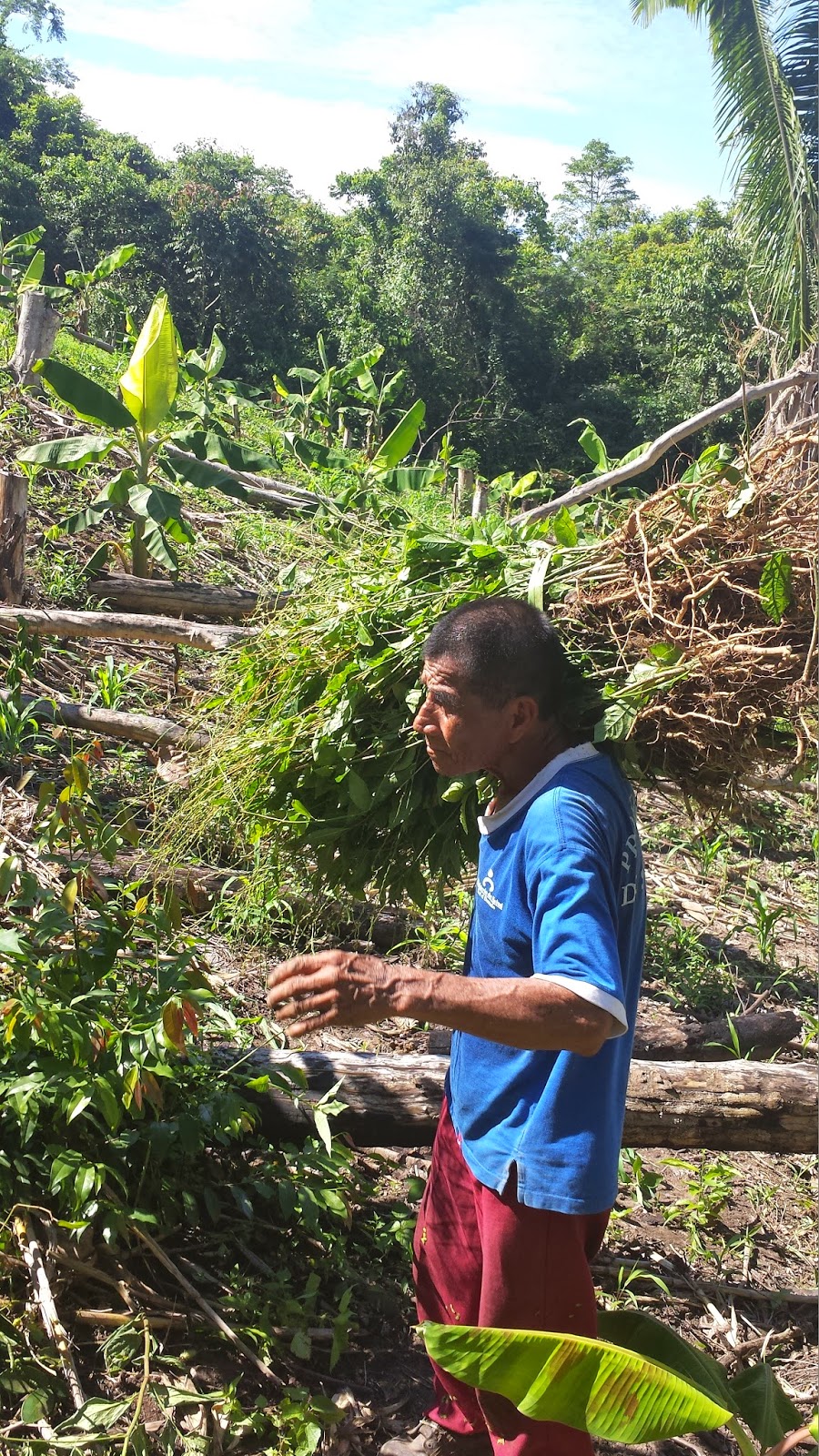Hola from steamy Peru! We're definitely into the rainy season here, but that hasn't kept us from pursuing "business as usual". We recently got back from a second trip out to Chirik Sacha and the surrounding areas where we added to our knowledge of the medicinal plants sector here in the San Martin region. So as promised today is about a walk in the woods...
This trip was a two day adventure, including a trip to Huaja, a small village about two hours drive from Tarapoto. As we have found wherever we go here, we were warmly welcomed to the home and farm of a couple living in Huaja.
We hiked through a clearing behind the house, then up into the bush. I was immediately aware of how easily you could get lost, as we pushed our way along a near-invisible trail with vines and shrubs entangling our legs and slippery mud beneath the leaves underfoot.
It was cloyingly hot in there where the breeze didn't reach, but the smell of dampness and foliage filled the air. We hiked only for about 15 minutes or so, and suddenly came to a large clearing, the purma. A purma is a second-growth forest, either naturally reseeding itself, or having been reseeded with trees and other plants by the owners.
Plantain trees are a foundation plant in the purmas. They are fast-growing trees, and even when small provide shade and the basis of a small micro-ecosystem for plants such as shade-lovers and vines that require support. Many of these are medicinal plants. Plantain trees also provide their thick, leathery leaves, which the people here use as wraps to put the harvested plants into, and to tear strips off for tying bundles together.
They can also be pressed into service as sombreros to cover your head from the blazing sun.
As we watched and asked questions, the couple harvested medicinal plants. Nana plucked leaves individually from a different type of medicinal plant and tucked them into the large woven bag she carried with her. Her husband used a large machete to dig out the plants he was harvesting, as the entire plant is used, roots to leaf tips.
In the tangle of the undergrowth, I had difficulty differentiating one plant from another, but as the pile of harvested plants grew on its bed of plantain leaves, it was obvious the couple knew exactly what they were doing. We spent the time in the purma taking photos and asking endless questions about the trees and plants. We also had the opportunity to try Cana, which is a plant used to quench thirst.
It is a large sprawling plant with long narrow leathery leaves and cane-like stems. The canes contain a slightly citrusy and vaguely sweet sap, which you suck out of the cane. It's delicious and immediately refreshes. As an added bonus it has large exotic flowers, a feast for the eyes.
Within an hour, the harvest was finished, with a large bag full of leaves and a huge pile of harvested plants to show for their efforts. Turi cut strips of dry plantain leaves and tied his harvest into two big bundles.

Nana carried a bundle nearly as large as his, as well as her bag of leaves, and neither of them would hear of being helped. As we picked our way back through the forest on the faint trail, I reflected on what my definition of "hard work" has been to this point.
People work incredibly hard here to make a living, under difficult circumstances and with the most basic of equipment, yet they don't boast or complain, and are quick to share what they have with us, total strangers. This cheerful hospitality is one of the things I have consistently found here in Peru, from people in the city of Tarapoto itself, and from the people we visit with in the communities surrounding it. It has caused me to rethink how I perceive hospitality, sharing, labor, and needs versus wants. Every person I meet here and every experience adds to this renovation-in-progress.
Medicinal plants in their raw, unprocessed form, are sold by weight, so the next stop in the business for today was the river. We arrived back at the farm, then walked down through a pasture area to the river. The cool shade and the sound of the water running over rocks was as welcome as an oasis for us, after the heat of the jungle. The plant bundles were carefully opened on a large boulder, then handfuls of them taken into the water and all dirt washed away.
Once this task was completed the water was shaken off them and the plants re-bundled to carry back up to the house. Here they were weighed, then placed carefully into large plastic- coated burlap sacks for shipment.
But that too, is another story. Next time, I'll feature some of the beautiful and useful plants that are used here for food, medicine and in other aspects of daily life. The jungle is an incredibly rich source of these necessities, there for the using by people who understand and respect it. It is pantry, pharmacy, artist's studio and tool-shop to those who live in it. There's something very right about that.
Until next time mis amigos y amigas, I wish you health and happiness, and hope that these reflections and adventures give you food for thought. It's a rich and lovely world we live in, when we stop long enough to look at it. The next time you are out and about, do it on foot, and look around you. Really look. You will be blessed.












No comments:
Post a Comment